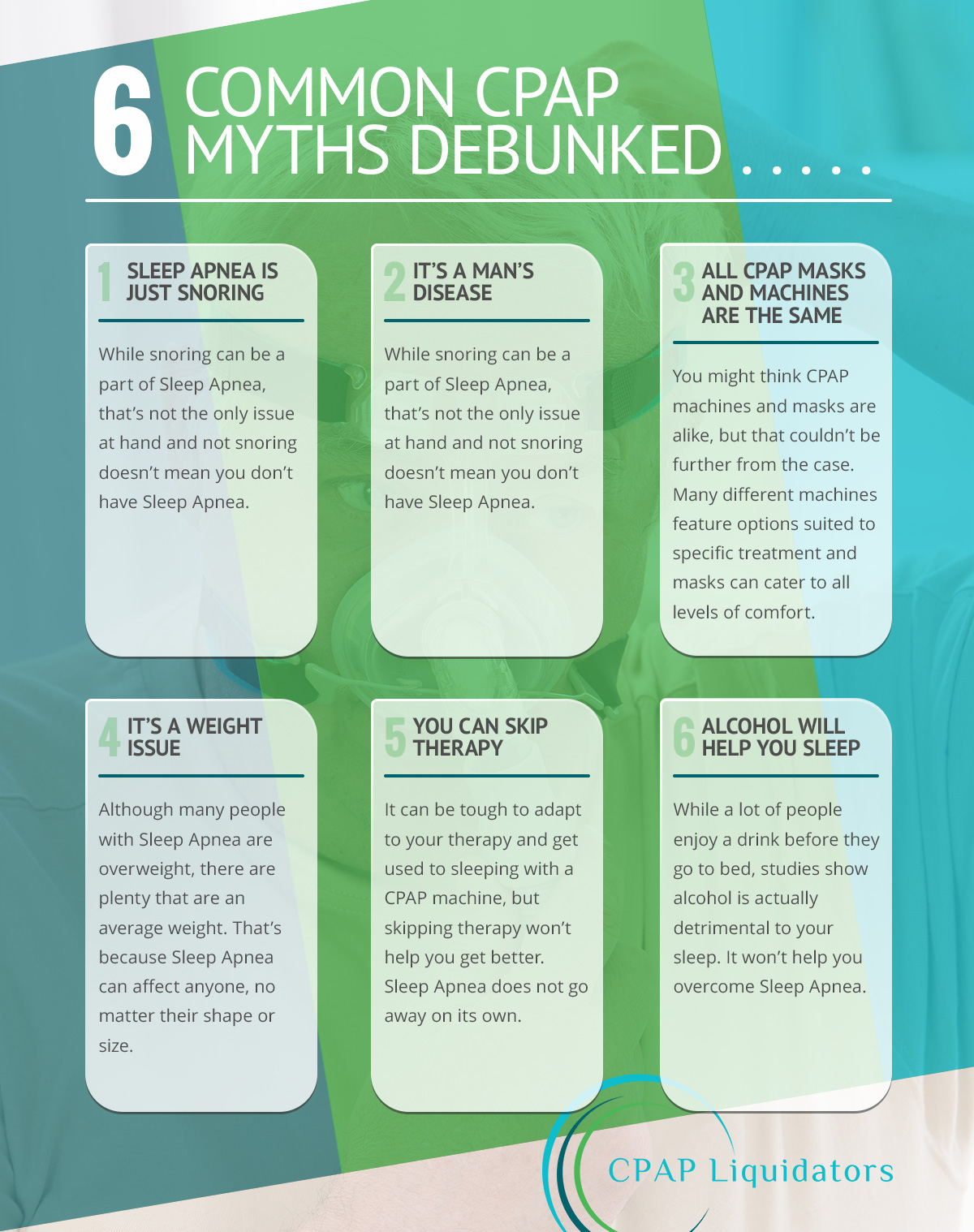Posted by CPAP Liquidators on Jun 18th 2018
6 Common CPAP Myths Debunked
Obstructive Sleep Apnea (OSA) is possibly the most widespread sleep disorder, affecting an estimated 18 million Americans. With this disorder affecting so many people, it’s natural for myths and misconceptions to arise. To help you get the most out of your CPAP therapy, we’ve gathered five of the most common myths about CPAP and Sleep Apnea to debunk them. If you’re looking for a new or refurbished CPAP machine, look no further than CPAP Liquidators. We have a wide range of machines available so you can find the perfect one for your needs.

-Sleep Apnea is just snoring
Many people make the assumption that Sleep Apnea is just a fancy way to describe snoring, but that’s not the only symptom. Snoring does often lead to a diagnosis of Sleep Apnea, especially when it is especially loud or involves choking or gasping while sleeping. However, this also leads people to believe that if they don’t snore, they don’t have Sleep Apnea, when that is not the case. Just because you don’t snore doesn’t mean you’re free of Sleep Apnea, because you may still have an obstruction that blocks your breathing as you sleep.
-It’s a man’s disease
With many men being diagnosed with Sleep Apnea, it has become a common misconception that only men deal with it. Yet an estimated six percent of women have the condition as well. That number might be lower than the reality, as many women with Sleep Apnea go undiagnosed. This is due to women not experiencing the same symptoms as men and with a lower likelihood of snoring, they might not even notice something is wrong. When women have OSA, they are more likely to suffer from insomnia, fatigue, and depression.
-All CPAP machines and masks are the same
When people are first diagnosed with Sleep Apnea, they are generally given a CPAP machine and mask by a Durable Medical Equipment Provider (DME). What they may not be aware of when they receive their mask and machine is that there are many different options available to CPAP users. Those options can do a lot to making their therapy much more comfortable and suited to the treatment they require.
-It’s a weight issue
It is often assumed that Obstructive Sleep Apnea goes hand in hand with being overweight. Although a majority of those who have been diagnosed do have an above average BMI, that is not to say it is purely a weight issue. That is because there are a significant number of people of average weight that also suffer from Sleep Apnea. The fact is, Sleep Apnea can affect anyone, no matter their shape or size. Sometimes it can be an issue with genetics. The construction of our throat is the main cause of Obstructive Sleep Apnea, and just like you might look like your parents, you might also inherit issues that make you prone to OSA.
-You can skip therapy
It can be quite difficult to adjust to CPAP therapy, with many people finding it hard to get used to sleeping with something on their face. This often leads people to abandon their therapy. When people don’t take their sleep disorder seriously, they believe they can get by just fine without sticking to their prescribed therapy. However, Sleep Apnea is an incredibly dangerous condition that will not get better on its own. When left untreated, Sleep Apnea can lead to more dangerous complications, such as high blood pressure, increased risk of heart disease, stroke, and cancer. If you have been diagnosed with Sleep Apnea, it is imperative you follow your therapy if you want to get better.
-Alcohol will help you sleep
When you struggle to sleep due to a disorder, it can be tough to try to overcome it. Many people have taken to having a drink before they go to bed to help them sleep, but that won’t help as much as you might think it would. On the contrary, studies have shown that alcohol is actually detrimental to sleep. As a depressant, alcohol will make you drowsy, but it will also inhibit your ability to reach the Rapid Eye Movement (REM) cycle of your sleep. The REM cycle is where our body gets the most rest and is incredibly vital to a healthy life. Additionally, alcohol will relax your muscles, including your soft palate, which can lead to more apneic events.
Sleep Apnea is a disorder that can throw your life in disarray. You need sleep in order to function and be healthy, and when OSA steps in your way, you need to treat it properly. Learn from these debunked myths and we’re sure you’ll sleep soundly from here on out. If you are looking for a more comfortable CPAP mask that fits your face better, check out our inventory or give CPAP Liquidators a call today!
